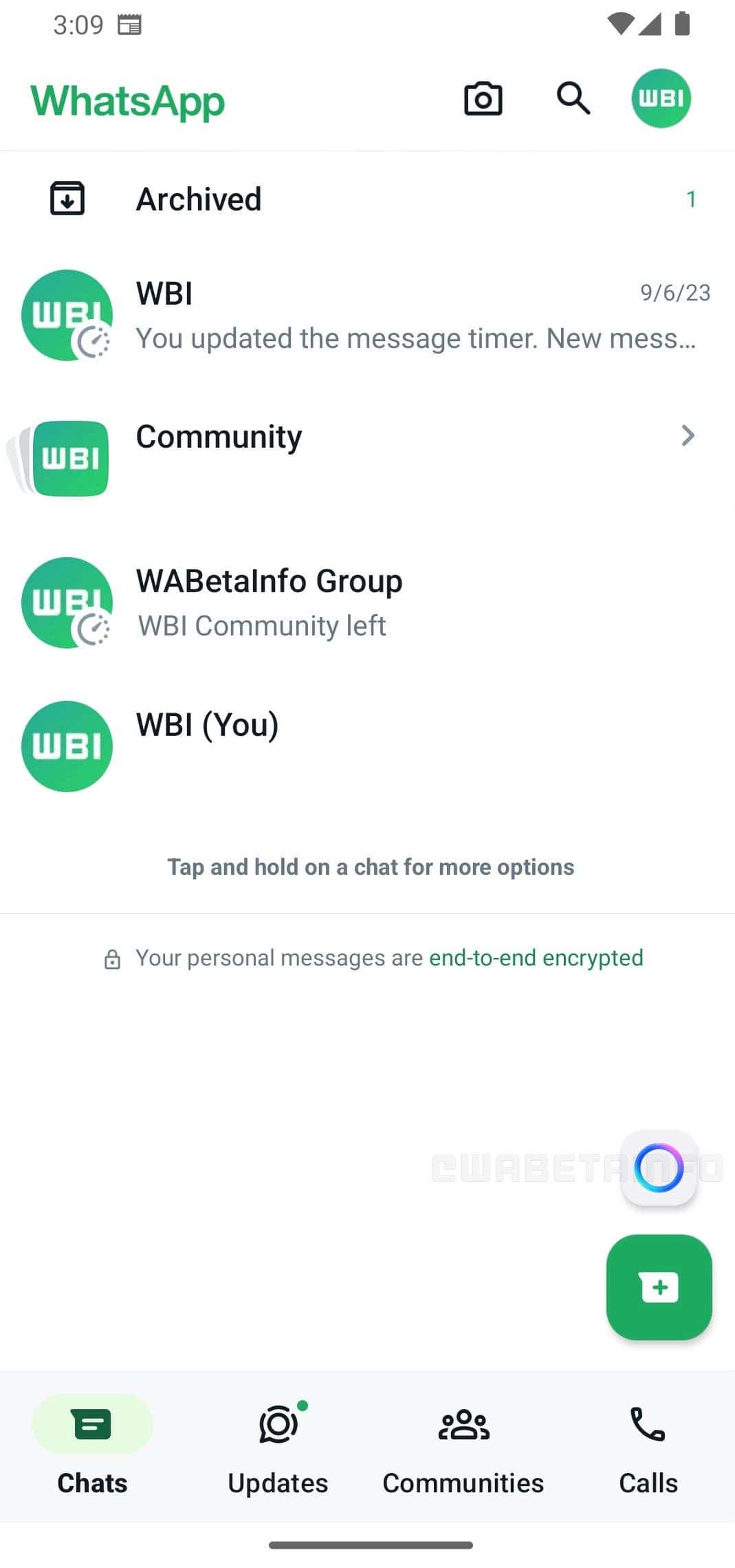Artificial Intelligence (AI) has been causing ripples across various applications on Android and other operating systems. Microsoft’s Copilot has found its place on Windows, while Google is making strides with its Bard chatbot and Search Labs experiments, captivating the interest of testers. Simultaneously, Meta is introducing an AI assistant to its suite of platforms, encompassing Facebook, Messenger, and WhatsApp. Notably, this AI chatbot is now undergoing a widespread rollout on WhatsApp.
In September of this year, Meta had revealed its intentions to explore the realm of AI chatbots for its widely-used services. At that juncture, the implementation closely resembled the models presented by OpenAI’s ChatGPT and Google’s Bard. Llama 2, a substantial language model, played a pivotal role in facilitating fluid and lifelike conversations. Additionally, a partnership with Microsoft Bing empowered the AI to efficiently search the web for answers to user queries. The AI’s versatility allowed users to pose any question or experiment with platform-specific features, such as AI-generated visual effects for Instagram photos. However, during this phase, only a select group of testers were granted access to these cutting-edge AI tools.
After several months of beta testing, it seems Meta has fine-tuned its AI offerings. WABetaInfo recently identified a new AI-powered chat shortcut in WhatsApp, signaling a broader rollout, at least within the beta channel—a positive development that suggests eventual availability in the stable channel.
The new shortcut for initiating a chat with AI appears as a floating action button (FAB) positioned just above the new message FAB in the Chats tab on WhatsApp. The distinctive design of this launch shortcut—a multicolor circle within a pale gray button—significantly streamlines access to Meta’s AI in WhatsApp. This is a departure from its previous location within the Contacts section. Making the feature more visible to users, especially those encountering it for the first time.
According to WABetaInfo, WhatsApp beta version 2.23.24.26 is currently compatible with this AI-powered feature. And there are reports of some testers witnessing it even on the older version 2.23.24.23. The availability of the former on the Play Store raises expectations that the AI chatbot on WhatsApp is inching closer to a stable channel release. In addition to this noteworthy development, the messaging app is already rolling out other significant features to users, including seamless integration with DocuSign for simplified digital signatures and voice chats tailored for larger groups—eliminating the need to initiate a disruptive voice call involving every participant.
As the integration of AI into popular communication platforms like WhatsApp becomes more prevalent, users can anticipate a more intuitive and engaging experience. Meta’s strategic moves in this direction exemplify the industry’s commitment to harnessing the potential of AI to enhance the functionality of everyday applications. As these advancements continue, users can look forward to a future where AI seamlessly integrates into their digital interactions, making tasks more efficient and enjoyable.
The potential benefits of integrating AI chatbots in Whatsapp

- Enhanced Customer Service: AI chatbots can provide 24/7 customer support, answering frequently asked questions, resolving common issues, and directing users to relevant resources. This can significantly reduce response times, improve customer satisfaction, and lower operational costs.
- Personalized Interactions: AI chatbots can personalize interactions based on user data and preferences. They can tailor responses, recommend products or services, and offer customized support, enhancing the overall user experience.
- Automation of Repetitive Tasks: AI chatbots can automate repetitive tasks such as answering FAQs, scheduling appointments, and handling simple transactions. This frees up human agents to focus on more complex issues and provide higher-level support.
- Multilingual Support: AI chatbots can communicate in multiple languages, breaking down language barriers and expanding the reach of businesses to a global audience.
- Improved Accessibility: AI chatbots can make WhatsApp more accessible to individuals with disabilities, providing an alternative to traditional text-based interactions.ù
- Enhanced Marketing and Sales: AI chatbots can be used for targeted marketing campaigns, personalized product recommendations, and lead generation. They can also provide sales support, answering product-related questions and guiding customers through the purchase process.
- Data Collection and Insights: AI chatbots can gather valuable data about user interactions, preferences, and feedback. This data can be analyzed to improve customer service, refine marketing strategies, and develop new products or services.
- Continuous Learning and Improvement: AI chatbots can continuously learn and improve their responses based on user interactions and feedback. This ensures that they remain relevant, helpful, and up-to-date.
- Reduced Costs: AI chatbots can significantly reduce costs associated with customer service, marketing, and sales, freeing up resources for other areas of the business.
- Increased Productivity: AI chatbots can help businesses operate more efficiently by automating tasks, providing self-service options, and handling routine interactions. This can free up employees to focus on higher-value activities.
- Global Reach: AI chatbots can overcome language barriers and reach a global audience. Allowing businesses to expand their market presence and connect with customers worldwide.
- 24/7 Availability: AI chatbots can provide 24/7 support. Ensuring that customers can get assistance whenever they need it, regardless of time zone or location.
- Personalized Shopping Experience: AI chatbots can provide personalized shopping experiences. Recommending products based on user preferences, purchase history, and browsing behavior.
- Real-time Product Information: AI chatbots can access and provide real-time product information, such as pricing, availability, and shipping details.
- Order Tracking and Support: AI chatbots can assist customers with order tracking, provide status updates, and resolve any issues related to orders or deliveries.
- Proactive Engagement: AI chatbots can proactively engage with customers, offering suggestions, providing reminders, and sharing relevant information.
- Feedback Collection and Analysis: AI chatbots can collect feedback from customers, identify areas for improvement, and provide insights into customer preferences.
- Sentiment Analysis: AI chatbots can analyze customer sentiment, gauge satisfaction levels, and identify potential issues early on.
- Fraud Detection and Prevention: AI chatbots can be used to detect and prevent fraudulent activities, protecting both businesses and customers.
- Integration with Existing Systems: AI chatbots can be integrated with existing customer relationship management (CRM) systems. Providing a seamless experience for both customers and businesses.
- Enhanced Brand Reputation: AI chatbots can contribute to a positive brand reputation by providing prompt, efficient, and personalized support. This can lead to increased customer satisfaction, loyalty, and advocacy.
- Competitive Advantage: AI chatbots can provide businesses with a competitive edge by offering innovative and differentiated services. This can help businesses attract new customers and retain existing ones.
- Adaptability to Changing Needs: AI chatbots can continuously adapt to changing customer needs and preferences. Ensuring that businesses stay relevant and competitive in the ever-evolving digital landscape.
- Scalability to Growing User Base: AI chatbots can effectively handle a growing user base without compromising the quality of service. This makes them ideal for businesses that are expanding their reach or experiencing a surge in customer interactions.
- Integration with Existing Marketing Strategies: AI chatbots can be integrated with existing marketing strategies. To enhance targeted campaigns, personalize messaging, and optimize customer engagement.
- Improved Employee Satisfaction: AI chatbots can reduce the workload and stress on human customer service agents. Leading to improved employee satisfaction and productivity.
- Future-Proofing Business Operations: AI chatbots represent a forward-thinking approach to customer service and business operations. Ensuring that businesses are well-positioned for future advancements in technology.
- Reduced Environmental Impact: AI chatbots can contribute to sustainability efforts by reducing paper consumption and the need for physical customer service interactions.
- Fostering Innovation and Creativity: AI chatbots can open up new possibilities for innovation and creativity in the realm of customer service and marketing. Leading to unique and engaging experiences for customers.
Overall, integrating AI chatbots in WhatsApp can significantly enhance customer service, improve marketing and sales efforts, and streamline business operations. As AI technology continues to evolve, the potential benefits of AI chatbots are only expected to grow.




